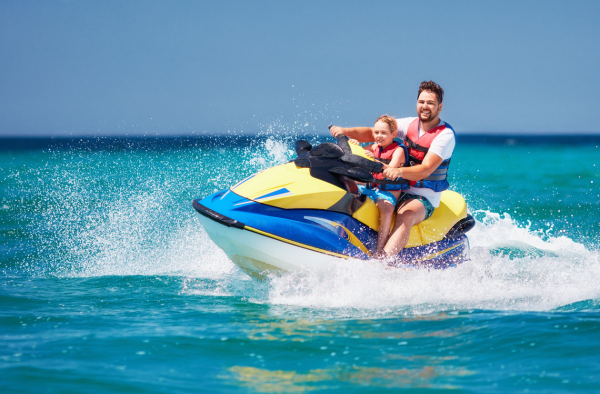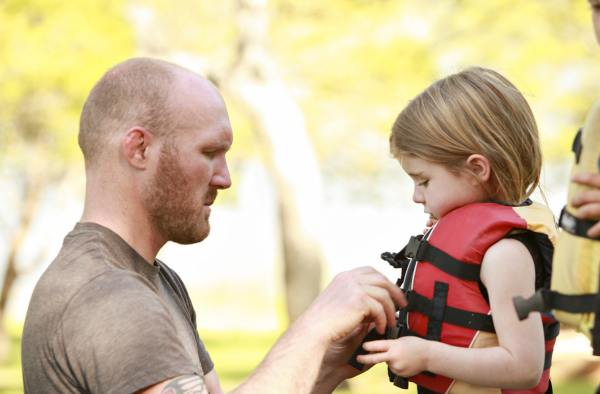It may be impossible to surpass a jet ski in terms of coolness. After all, jet skis are a symbol of freedom – representing financial abundance, independence, and the culmination of the American dream. For countless Michiganders, owning a jet ski simply means – you’ve made it.
Despite their popularity amongst recreational boaters, the exact rules and regulations governing the use of jet skis are not always the most clear and accessible – especially compared to traditional boating laws. The aim of this blog is to explain some of the special laws surrounding jet ski use so you can operate safely on your next outing.
Licensing Requirements
Do you need a license? In Michigan, there is no traditional requirement for a boating license. Rather, certain individuals are required to participate in a boater safety course to obtain what is known as a boater safety certificate. The requirements for obtaining a boating safety certificate are as follows:
- Boaters born after June 30, 1996: Must have a boating safety certificate to operate any motorized vessel, including jet skis.
- Boaters born after December 31, 1978: Must have a boating safety certificate to operate a personal watercraft (PWC), regardless of age
You can get your boating safety card by completing a state-approved boating safety course – available both online and in person.
Are there age restrictions? The age restrictions for operating a personal watercraft (jet ski) in Michigan are as follows:
- Boaters less than 14 years old: may not legally operate a PWC.
- Boaters 14-15 years old: may operate a PWC only if they have a boating safety certificate and are either:
- Accompanied on board by a parent, legal guardian, or designated adult (21+), or
- Operating within 100 feet of such a person
- Boaters 16 years and older: Must have a boating safety certificate if born after December 31, 1978
Registration and Equipment
Do jet skis need to be registered like boats? All motorized vehicles, including PWC, are required to be registered with the Michigan Department of State. Registrations are issued for 3 years and expire on March 31 of the third year. In Michigan, the registration number and validation decals must be displayed as follows:
- Number must be painted, applied as a decal, or otherwise affixed to both sides of the bow as high above the water line as practical.
- Number must read from left to right on both sides of the bow.
- Number must be in at least three-inch-high BLOCK letters.
- Number’s color must contrast with the color of the background and be distinctly visible and legible.
- Letters must be separated from the numbers by a space or hyphen: MC 3717 ZW or MC-3717-ZW.
- No other numbers may be displayed on either side of the bow.
- Decals must be affixed on each side of the vessel and placed three inches after the last character of the registration number.

Because most jet skis feature inboard, permanently affixed motors, they are legally required to be titled in the state of Michigan. Information regarding how to obtain a registration and title can be found on the Michigan Department of State’s website.
What equipment is required to operate a jet ski? Operating a jet ski legally in Michigan requires adherence to some specific safety equipment regulations. For starters, as with all other boats in Michigan, a personal flotation device (PFD) is required for every person on board a jet ski. It’s important to note: inflatable PFDs are not allowed on PWC.
In addition to personal flotation devices, PWC must have the following equipment on board:
- Engine Cut-Off Lanyard (Kill Switch)
- Sound-Producing Device (Whistle or Horn)
- Fire Extinguisher
- Navigation Lights
Make sure you have these items with you (on your PWC) at all times – in order to ride safely and responsibly.
Where You Can and Can’t Ride
No wake zones: As alluded to in a past blog about no wake zones, PWC are heavily regulated with regard to where they are allowed to be driven and produce wake.
Like other boats, PWC must be operated at slow, no wake speed within 100 feet of shorelines, moored and anchored watercraft, piers, rafts, swimming areas, and swimmers. Additionally, PWC must be operated at the same slow speeds within 200 feet of any Great Lakes shoreline.
There is also a law with regard to crossing behind the wake of another vessel. A PWC must be operated at “slow, no wake speed” if crossing within 150 feet behind another vessel unless the other vessel is also a PWC.
Speed limits: In addition to respecting slow speed limits, PWC must adhere to the same 55 mph max speed limit that other boats do (in open water). Similarly, PWC are expected to be operated in a reasonable and prudent manner at all times. This means it is illegal to:
- Jump the wake of another vessel
- Weave through congested traffic
- Swerve at the last moment (purposely) to avoid a collision
Hours of operation: In addition to the restrictions on where you can ride PWC, there are also restrictions on when you can ride them. It is illegal to operate a PWC in Michigan waters from sunset until 8 a.m.. This means no night time jet ski rides – even with appropriate lighting!
Alcohol and Drug Use
PWC are regulated just like any other vehicle or vessel when it comes to alcohol and drug use. If you are impaired, do not attempt to operate a personal watercraft. It is illegal, and you can potentially be charged with a felony if you seriously injure or kill someone in the water.
Alcohol and boats do not mix well. If you are planning on drinking, make sure you aren’t the one responsible for steering the ship – literally.
Get David Get Paid
If you or a loved one was injured as the result of irresponsible jet ski operation, make sure to reach out to Femminineo Law today. The team here at Femminineo Law is one of the best and brightest in the industry. You can rest assured that if you were injured on the water, you will receive the compensation needed to get your life back on track.
Give us a call today at 855-65-CRASH or visit our website at getdavidgetpaid.com.
Get David Get Paid.



